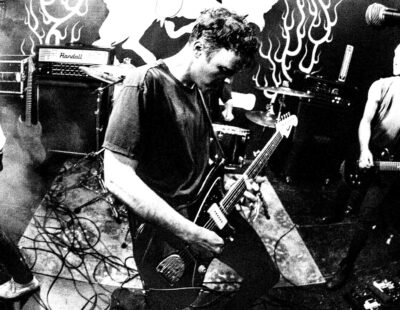I remember chatting on the phone with Mike Williams about Eyehategod’s follow-up to 2000’s Confederacy of Ruined Lives, how it was going slowly as he was dealing with his incarceration issues, his health, the aftermath of Hurricane Katrina, and the difficulty of getting all five members in the same room together. There was no firm date, but the intent to record was always there. That was early 2007. My youngest niece was due to be born that summer, we were still smack in the middle of George W. Bush’s reign of idiocy, and the Saskatchewan Roughriders had only two Canadian football championships in 100 years.
Today, my brilliant niece is acing school and is cruising into second grade. Bush is long gone, but America still isn’t faring much better. My beloved Roughriders have since won two Grey Cup titles. Yes, I watch Canadian football. And finally, incredibly, there’s a completed Eyehategod album on my iPhone. How time flies.
After all the delays, side projects, and tragedy that put Eyegategod’s fifth album on hold for so long, the long, long-awaited record feels so comfortably like Eyehategod, it feels so mid-stride, that it’s as if the last 14 years didn’t even happen. For me personally, there were only two things I wanted from this release: poetry and blues, and indeed this self-titled album brings both, in spades. The poetry is a given, as Williams is a gifted wordsmith, able to translate his observations and inner pain into vivid portraits from the New Orleans gutter. But musically, what has always drawn me to the band is the way guitarist Jimmy Bower and Brian Paton so deftly infuse their Sabbath-derived riffs with the swampiest blues influences, rendering the form even grittier, merciless, and more savage than it already was.
So it felt a bit distressing to initially hear Eyehategod (Housecore) open with the d-beat crust punk of “Agitation! Propaganda!”, which initially comes off as a scorching but fairly rote composition for such a talented, groundbreaking band. Thankfully, though, the song is a red herring, as the rest of the album settles into the kind of lugubrious, kudzu-thick grooves you’d expect from the band. “Parish Motel Sickness”, “Robitussin and Rejection”, and “Worthless Rescue” are all perfect examples of Eyehategod firing on all cylinders, Williams snarling away in his tortured voice as Bower and Patton evoke Tony Iommi and Robert Johnson, while bassist Gary Mader and the late Joey LaCaze hold down the fort with a rhythm section worthy of comparison to Butler and Ward.
The overall feel of the album might come across as less unhinged than the genius mid-‘90s one-two wallop of Take As Needed For Pain and Dopesick, but while it’s permeated with the control and authority that middle age brings, the ferocity is still there, which serves as a perfect counterpoint to the genuine soul exhibited in the music and lyrics. When you hear the way “Framed to the Wall” careens from insane hardcore punk to the wickedest electric blues riff, it feels far, far more satisfying than any Down EP or Corrections House album can ever be. It feels as close to perfect and right an Eyehategod album as anyone could possibly hope for in 2014. That’s all anyone ever wanted, and the guys delivered.
It’s a huge, huge week for new metal releases, and it was impossible to even make a dent in the list of 50-odd titles. But here are 14 more, including a few more I highly recommend:
Black Anvil, Hail Death (Relapse): The third full-length by the New York band has its moments – “G.N.O.N.”, the brilliant epic “Next Level Black”, the cover of KISS’s The Elder nugget “Under the Rose” – but for a band that purports to have used Master of Puppets and Destroyer as models, this album has nowhere near enough of any of those qualities. Too many songs don’t know when to stop, the album plods along for 71 exhausting minutes, and the snarled vocals lack the kind of personality that can help keep things interesting. Coming off a pair of strong, concise albums, the excess shown here is troubling. There’s something to be said about leaving an audience wanting more, and this record is simply too much.
Crowbar, Symmetry In Black (eOne): Crowbar’s tenth album, and first in three years, gives longtime fans exactly what they want, nothing but the signature New Orleans sludge Kirk Windstein has been churning out for the last 25 years. It’s a bit of a shame that this album had to come out the same week as the long-awaited new record by fellow NOLA pioneers Eyehategod, and it’s nowhere near as exciting, but what will work in Crowbar’s favor is its mainstream appeal. Black Label Society and Down have popularized this style of music, especially over the last decade, and more melodic fare like “Symmetry in White”, “The Taste of Dying”, and “The Foreboding” should win over some new listeners.
Dead Congregation, Promulgation Of The Fall (Profound Lore): It’s absolutely insane how an extreme metal album in this day and age will garner high praise simply for being competent, but the songwriting skill shown on the Greek band’s first album in six years so eclipses that of so many other death metal bands that it’s kind of embarrassing. It brings no new ideas, only executes the music in impeccable fashion, sounding plenty intense but always shifting gears from full-on 1990s death metal to more subdued, ominous doom passages. Normally an album this devoted to copping Incantation’s similar groundbreaking style would compel me to say, “Just listen to Incantation instead of this,” but Dead Congregation is so on top of its game here that it deserves to be singled out, not only for the power of such highlights as “Immaculate Poison” and “Only Ashes Remain”, but as a lesson to all other extreme bands on how to keep listeners engaged. It’s damn near masterful. Listen via Bandcamp.
Emptiness, Nothing But The Whole (Dark Descent): What makes this album by the Belgian black metal band is how devoid of structure the music is, but it’s always kept under control, always creating just the right atmosphere, feeling unpredictable but never arbitrarily so. Whether tossing in some sneaky post-punk melodies, rhythm riffs lifted straight off King Crimson’s Red, or passages reminiscent of Slint, you’re constantly on edge, eager to hear where these brooding, erratic yet strangely concise songs head next. “All is Known” is a mind-blower, the mark of a band with actual ideas rather than relying on boring clichés. What an exciting little black metal find this is.
Enabler, La Fin Absolue Du Monde (The Compound/Creator Destructor): Like on the debut album All Hail the Void, the latest by Enabler gets more interesting the more melodic the guitar work gets. Sure, the band does crust as well as anyone these days, but when the guitars veer more towards post-punk, when the riffs have fun with quirky atonal melodies reminiscent of Drive Like Jehu, as on “Close My Eyes” and “Balance of Terror”, it truly stands out. Fewer clichés, more idiosyncrasy, guys.
Kiss, Kiss 40 (Universal): This is so stupid. Another compilation?! That makes the score studio albums 20, comps 13. Sure, the hilariously goofy “God of Thunder” demo is a worthwhile curiosity, but even with a gimmick like this – one track per album – it’s pointless, especially in this day and age where a person can make his or her own KISS compilation. In fact I’ve made one on Rdio, following the same criteria as KISS 40, and it’s far better than what Gene and Paul are selling. Listen to it here.
Marty Friedman, Inferno (Prosthetic): I can’t stand solo albums by metal guitarists. I think the last one I truly liked was Satriani’s Surfing With the Alien in 1987. And Yngwie’s first three albums before that. Far more often than not, though, shredder albums always turn out to be tiresome exercises in technicality, aimed strictly at readers of Guitar World rather than, say, people who enjoy actual music. Needless to say I was dreading listening to the new solo album by the former Megadeth guitarist, but when a magazine assignment forced me to hear the thing, I was floored by just how flat-out fun it turned out to be. Yes, it’s self-indulgent, but only in that Friedman is indulging himself in every style of metal and hard rock he thoroughly enjoys. And he sells the hell out of it. Whether combining prog and flamenco with Rodrigo y Gabriela, exploring Shining-style prog with Jorgen Munkeby, playing balls-out garage rock with the inimitable Danko Jones, or going full-on Bodom with Alexi Laiho, he pulls it off with joy and verve. I don’t think I’ve been more pleasantly surprised by a metal album in 2014 so far than this one.
Metsatöll, Karjajuht (Spinefarm): The Estonian band’s sixth album in ten years has no surprises at all, simply catering to the Paganfest crowd with ebullient yet ultimately repetitive polka beats and flute melodies.
Misery Index, The Killing Gods (Season Of Mist): Misery Index might have taken an agonizing four years to put out a new record, but despite the departure of longtime guitarist Sparky Voyles, its hybrid of death metal and grindcore hasn’t lost a step at all. One of this band’s great hallmarks is the way the music is so taut and aggressive, yet is always in complete control, dynamic enough to wriggle into your head with its clever use of melody, which in turn accentuates Jason Netherton’s commanding vocals. Netherton’s smart, politically charged lyrics are always a pleasure to delve into, but typically they were not provided to writers, so I can’t comment on them. However, tracks like “Conjuring the Cull”, “The Harrowing”, and “The Weakener” rank as some the most immediately gratifying Misery Index songs I’ve ever heard.
Obsequiae, Suspended In The Brume Of Eos (20 Buck Spin): There are moments on this reissue of the Minnesota band’s debut album that you can sense its combination of black metal and Medieval-inspired melodies is on to something. It’s still a long way off from coalescing as beautifully as, say, Agalloch, but enough promise is shown to bode well for the actual new album, which is apparently due later this year. While I can’t say this is a buyer, it’s well worth hearing, which you can do via Bandcamp here.
Sabaton, Heroes (Nuclear Blast): Despite the band’s sincerity, Sabaton’s war-themed power metal has always flirted with sounding cartoonish, but as 2012’s remarkable Carolus Rex proved, the band is better off when working within the constraints of a concept album. It sharpens the focus of the songwriting, and that record benefited from the gravitas of the story it was telling. While the songs on the new album follow a theme of sorts – each track focusing on specific World War II heroes – the approach is much looser, and consequently, this otherwise crisply paced album slips off the rails a little bit. There’s plenty of typically rousing material here (“Night Witches”, “To Hell and Back”), but detours into schmaltzy ballads and a handful of tracks that flirt with self-plagiarization make this record an unfortunately inconsistent – and dare I say lazy – follow-up to an inspired breakthrough album.
Unisonic, For the Kingdom (Armoury): In advance of the new album that’s due this summer, the project by former Helloween bandmates Kai Hansen and Michael Kiske has put out a teaser EP, featuring a pair of new songs as well as four live tracks. “For the Kingdom” and “You Come Undone” are terrific power metal tunes written by Hansen and sung with authority by the ageless Kiske, and although no Helloween covers are included in the live tracks (darn) they’re solid enough for fans to enjoy. These guys work so well together, that Hansen should ditch the well-past-its-best-before-date Gamma Ray and stick with this full-time.
Vainaja, Kadotetut (Svart): The debut album by the Finnish band is a very good exercise in straightforward, Candlemass-derived doom, but it would be served much better with actual singing than a generic death growl. That said, the vocals thankfully do not severely detract from the actual music, which at times is gloriously powerful.
Vanhelgd, Relics Of Sulphur Salvation (20 Buck Spin): Sure, the raw power of old school Swedish death metal is its biggest hallmark, but it’s always even more interesting when bands incorporate those mournful Scandinavian melodies into such pulverizing arrangements. Vanhelgd nail that sound on its third album, the harshness accentuated by striking, melancholy guitar work that gives the tunes a little frostbitten soul.
Not metal, but totally worth hearing:
Owen Pallett, In Conflict (Domino): Owen Pallett’s singing on his past albums He Poos Clouds and Heartland has always felt a little too mannered for my liking, but his ingenious use of looped violin has always been mesmerizing to hear. The latest solo album by the Oscar-nominated, Polaris Prize-winning artist, on the other hand, is a huge breakthrough, venturing into more diverse territory. With such guest musicians as Brian Eno and the Prague FILMharmonic Orchestra (which has collaborated with Septicflesh on a pair of occasions), his poetic, confessional compositions are given a richness that rivals the work of Decibel’s own John Darnielle. And the more the album goes, the more brilliant it shines, veering from lithe new wave (“Song For Five & Six”), to swooning balladry (“The Secret Seven”) to stunning, unadulterated progressive rock (“The Infernal Fantasy”). In turn the florid arrangements complement his singing wonderfully, making for a wildly original pop experiment.





